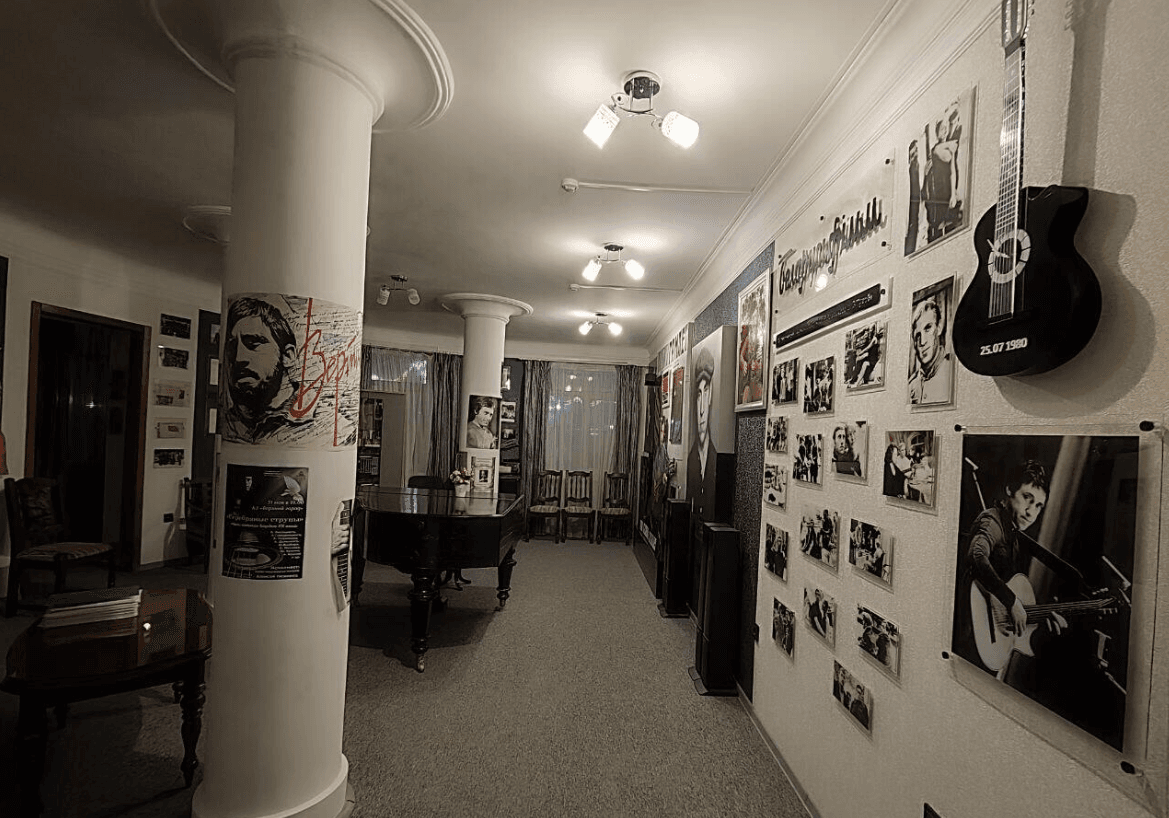Brest. Vysotsky Museum.
Museum
Belarus, Brest region, Brest, Lenin St., 2
Description
Vladimir Vysotsky is a symbol of sincerity, struggle for truth and creativity. His name is immortalized in museums, memorabilia, streets, ships, and even the 'Vladvysotsky' asteroid. There is a street and a Vysotsky museum room in Samarkand, and the tanker 'Vladimir Vysotsky' stores the poet's personal belongings. The Moscow-based 'Melodiya' company has released about 30 CDs of his songs, and the Swedish theater has staged a play about his work.
More than 10 books about Vysotsky have been published in Bulgaria, 150 poems and songs have been published in Poland, and a three-volume collection has been published in the USA. Brest is connected with his ancestors and life: a museum exposition has been created here, reflecting his work and cooperation with 'Belarusfilm'.
The museum includes Vysotsky's family tree, posters, letters, books and records. His work remains an inspiration for people of different generations, reminding of the importance of humanism and moral values.
Categories
Exposition
Historical
With children
Comments
Reviews to the Place
1Murphy Darkwalker
13.03.2025
Vysotsky Museum
For many people, Vladimir Vysotsky embodies an indefatigable desire for the truth, fierce resistance to lies, extreme sincerity in joy and sorrow, as well as a constant willingness to self-actualize and create. It is not surprising that in many cities of the former Soviet Union, Europe and America you can find memorable places associated with his name: museums, memorial plaques, streets named after him, monuments, ships and even the asteroid 'Vladvysotsky', which is registered in the catalog of planets of the Solar system under the number 2374 and moves between the orbits of Mars and Jupiter.
Here are just a few examples of how humanity preserves the memory of Vysotsky. In the village of Samarkand chemists, one of the streets bears his name, and a museum room dedicated to his work has been created in the Khimik Palace of Culture. A huge Novorossiysk Shipping Company tanker with a displacement of more than 16,000 tons is also named after him. There is a "Vysotsky cabin" on board the ship, where posters, personal belongings of the poet, photographs, books and records are kept.
The Moscow-based 'Melodiya' company has released about 30 discs with recordings of Vysotsky's songs, and various organizations have produced hundreds of badges and pennants with his portraits. In 1986, the Stockholm Fria-Proteatern Theater staged the play Songs of Vysotsky, giving his work a new lease of life on the Swedish stage.
Vysotsky's name is also well known in Bulgaria. Literary critic Lyuben Georgiev has published two books about the poet, and more than ten books dedicated to his work have been published in the country. About 150 of his songs and poems have been published in Poland, and the Rusica Publishing house has released a three-volume collection of his works in the USA.
The first International Bard Forum named after him was held in Brest, the city with which the Vysotsky family's roots are connected, and the book "Transit through the Bug", dedicated to his life and work, was published. Brest occupies a special place in Vysotsky's biography: here he stayed at the 'Bug' Hotel, and his paternal ancestors lived in this city, which was then called Brest-Litovsk.
The room where Vysotsky stayed has been recreated in the 'Bug' Hotel, and the thematic museum room "Belarusian Pages of Vladimir Vysotsky" has been opened. The exhibition includes photographs, letters, autographs, records and other materials related to his work. Special attention is paid to his cooperation with the Belarusfilm film studio, for which he wrote more than 20 songs.
The museum presents Vysotsky's family tree, which shows in detail his connection with Brest. The poet's great-grandfather, Shloime Vysotsky, moved to Brest-Litovsk from the village of Selets, and his grandfather, Wolf Shlemovich, was born here in 1889. Subsequently, the grandfather moved to Kiev, where he changed his name to Vladimir Semenovich, becoming the full namesake of his famous grandson.
Vysotsky has repeatedly visited Belarus, participating in the filming of films and recording songs. His work is deeply connected with this country, which is reflected in the museum's exposition. In the center of the room there are columns with movie posters, posters and portraits of Vysotsky, as well as copies of letters, invitations and other documents related to his life and work.
The museum also includes a library with more than 50 books about Vysotsky, as well as records and tape recordings. There were 436 books in the poet's personal library, among which a special place was occupied by the works of Pushkin, whom Vysotsky idolized.
Vladimir Vysotsky's work remains relevant today, uniting people of different generations and cultures. His songs and poems continue to inspire, reminding of the importance of goodness, moral values and human happiness.


-1741847565628.webp&w=3840&q=75)
-1741847566969.webp&w=3840&q=75)
-1741847562551.webp&w=3840&q=75)





